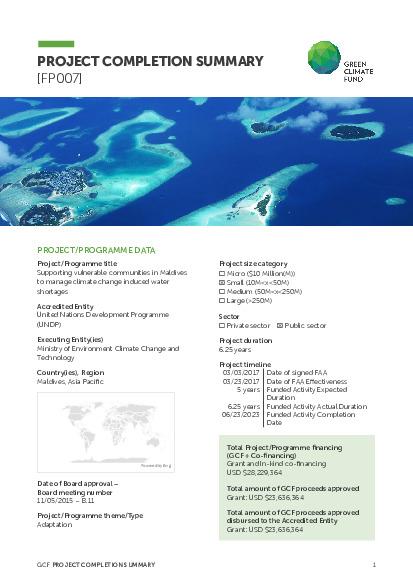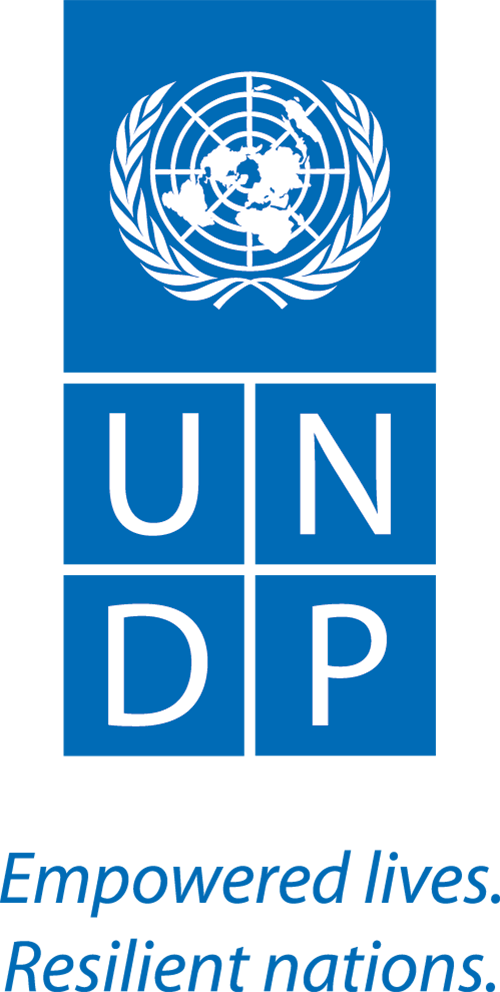FP007
Supporting vulnerable communities in Maldives to manage climate change-induced water shortages
Supporting vulnerable communities in Maldives to manage climate change-induced water shortages
The project aimed to provide safe freshwater access to 105,000 people across 111 islands1 in the Maldives, focusing on vulnerable communities facing significant drinking water shortages during the dry season. These shortages are exacerbated by climate-induced challenges such as variable rainfall and rising sea levels, which increase groundwater salinity. The project sought to scale up integrated water supply systems and improve groundwater quality for long-term resilience.
In terms of achievement, the project provided safe drinking water to 105,996 people across 29 islands through the 4 Integrated Water Resource Management (IWRM) and 25 Rainwater Harvesting (RWH) systems. Key achievements include establishment of additional 7,780 m³ water storage in the islands, 30% reduction in water production costs through solar integration, and establishment of regulatory frameworks including the Water and Sanitation Act. The project adapted to government policy shifts from centralized to decentralized governance and COVID-19 challenges. Critical lessons emphasized the need for coordination between infrastructure projects to prevent damage, skilled operator training for expanding water networks, and flexible design adaptation to align with national strategies. Sustainability ensured through partnerships with government departments, integration of training courses into national university systems, and regulatory capacity building within the Utility Regulation Authority.
Key lessons learned include the importance of performance-based consultant contracts with enforceable penalties and fully utilizing contractual authority to address delays. In-country technical support, particularly through a Chief Technical Advisor, proved more effective than remote assistance. Limited communication outputs highlight the need for greater visibility of project achievements. Improved inter-ministry coordination can prevent cross-project issues and enhance resource use. Challenges with government financial policies suggest the need for alternative operational arrangements or additional AE support. Reassessing the PMU structure to align with ministry mandates and revising the Gender Action Plan to focus on practical, achievable activities also strengthened project delivery.
The sustainability and exit strategy is anchored in strong government partnerships and institutional integration. Key components like the Learning Management System (LMS), Geographical Information System (GIS), groundwater studies, and monitoring systems are now overseen by the Water and Sanitation Department, with technical platforms jointly maintained by the Ministry of Environment, Climate Change and Technology (MECCT) and National Center for Information Technology (NCIT). Educational courses have been embedded in the Maldives National University, ensuring ongoing capacity building. The Maldives Meteorological Service (MMS) and the Utility Regulation Authority (URA) have enhanced technical and regulatory capacities, while new regulations and published research support long-term policy development. Investments in upgraded RWH, backed by government co-financing and utility cost-recovery mechanisms, ensure continued service delivery. To sustain impact, the next steps for the government include securing uninterrupted water provision, clarifying operational roles between councils and utilities, and leveraging groundwater research and Managed Aquifer Recharge (MAR) designs to expand baseline studies and mobilize additional funding. Overall, the project has made significant strides in improving water security for vulnerable communities in the Maldives, showcasing adaptability in the face of challenges and laying the groundwork for sustainable water management practices in the future.

Project completion summary for FP007: Supporting vulnerable communities in Maldives to manage climate change induced water shortages
12 Aug 2025
This Project Completion Summary (PCS), contains details from the Project Completion Report (PCR) submitted by Accredited Entities at the end of a project’s implementation timeframe. The PCS presents a concise overview of a completed project's performance and delivered outcomes. The summary includes four key components:
Project timeline
Pipeline
26 May 2015 • 164 days
Concept note received
26 May 2015
Funding proposal received
31 Jul 2015
Approved
05 Nov 2015 • 505 days
Approved by GCF Board
05 Nov 2015
Cleared by iTAP
05 Nov 2015
Legal opinion on AE's Internal Approval
25 Feb 2016
FAA executed
03 Mar 2017
Under implementation
23 Mar 2017 • 2,284 days
FAA effective
23 Mar 2017
Disbursement - USD 3,034,330
30 Jun 2017
Annual Performance Report
23 Mar 2018
Disbursement - USD 12,112,446
29 Nov 2018
Annual Performance Report
01 Mar 2019
Disbursement - USD 6,038,072
08 Jan 2020
Disbursement - USD 2,022,296
10 Mar 2021
Disbursement - USD 429,220
24 Sep 2021
Completed
23 Jun 2023
-
Financing
- Private sector
- Public sector
-
Size
- Micro
- Small
- Medium
- Large
GCF financing100% disbursed
| Instrument | Amount |
|---|---|
| Grant | USD 23,636,364 |
| Total GCF Financing |
|---|
| USD 23,636,364 |
Co-financing
| Co-financer | Instrument | Amount |
|---|---|---|
| Co-Financing | Grant | USD 4,493,000 |
| Co-Financing | Grant | USD 100,000 |
| Total Co-Financing |
|---|
| USD 4,593,000 |
GCF Contacts
Press enquiries & interview requests
GCF CommunicationsSend e-mail
Request for information
GCF Information DisclosureRequest information about this project
Project complaints and grievances
GCF Independent Redress Mechanism (IRM)Phone +82 32 458 6186 (KST)
File a complaint
Integrity issues
GCF Independent Integrity Unity (IIU)Phone +82 32 458 6714 (KST)
Send e-mail
Entity

United Nations Development Programme
Executive Coordinator
304 East 45th Street, FF-9th Floor, New York, United States
Principal Advisor Environmental Law and Policy
304 East 45th Street, FF-9th Floor, New York, United States
More contacts
National Designated Authority
Ministry of Tourism and Environment
Director General
Velaanaage 5th Floor, Ameeru Ahmed Magu,, Male’, Maldives
Director
Velaanaage 5th Floor, Ameeru Ahmed Magu,, Male’, Maldives
Director, Climate Change Department
Documents
Pages
News + Stories

From scarcity to sustainability: Maldives’ ambitious water security project
22 Mar 2024 / The Maldives, known as a luxury holiday destination with crystal blue water, is an idyllic island state in the Asia Pacific region. However, the Small Island Developing State (SIDS) is one of the most vulnerable nations to climate change and faces many unique challenges. Rising sea levels and increasingly erratic rainfall patterns are threatening the country's freshwater resources, putting the health and well-being of its people at risk.